Reflective Paper on Evolution of Classical and Contemporary Management
VerifiedAdded on 2023/06/18
|6
|1304
|195
Essay
AI Summary
This essay provides a reflection on management theories, contrasting classical and contemporary approaches. It begins by defining management and its functions, such as planning, organizing, staffing, directing, and controlling. The essay then delves into traditional management approaches, highlighting the importance of hierarchical structures, command and control, and financial rewards for employee motivation. It further explores classical theories, emphasizing the human approach and open system models. The discussion transitions to contemporary management approaches, noting the shift towards flexibility, adaptability, and innovation in response to globalization and complex business environments. The essay also reflects on feedback received during a formative assessment, acknowledging areas for improvement, such as incorporating definitions from prominent management thinkers and elaborating on management tools like Porter's 5 Forces. The conclusion reiterates the significance of management in organizational success and the value of learning from feedback for continuous improvement. Desklib offers a wealth of similar solved assignments and study resources for students.
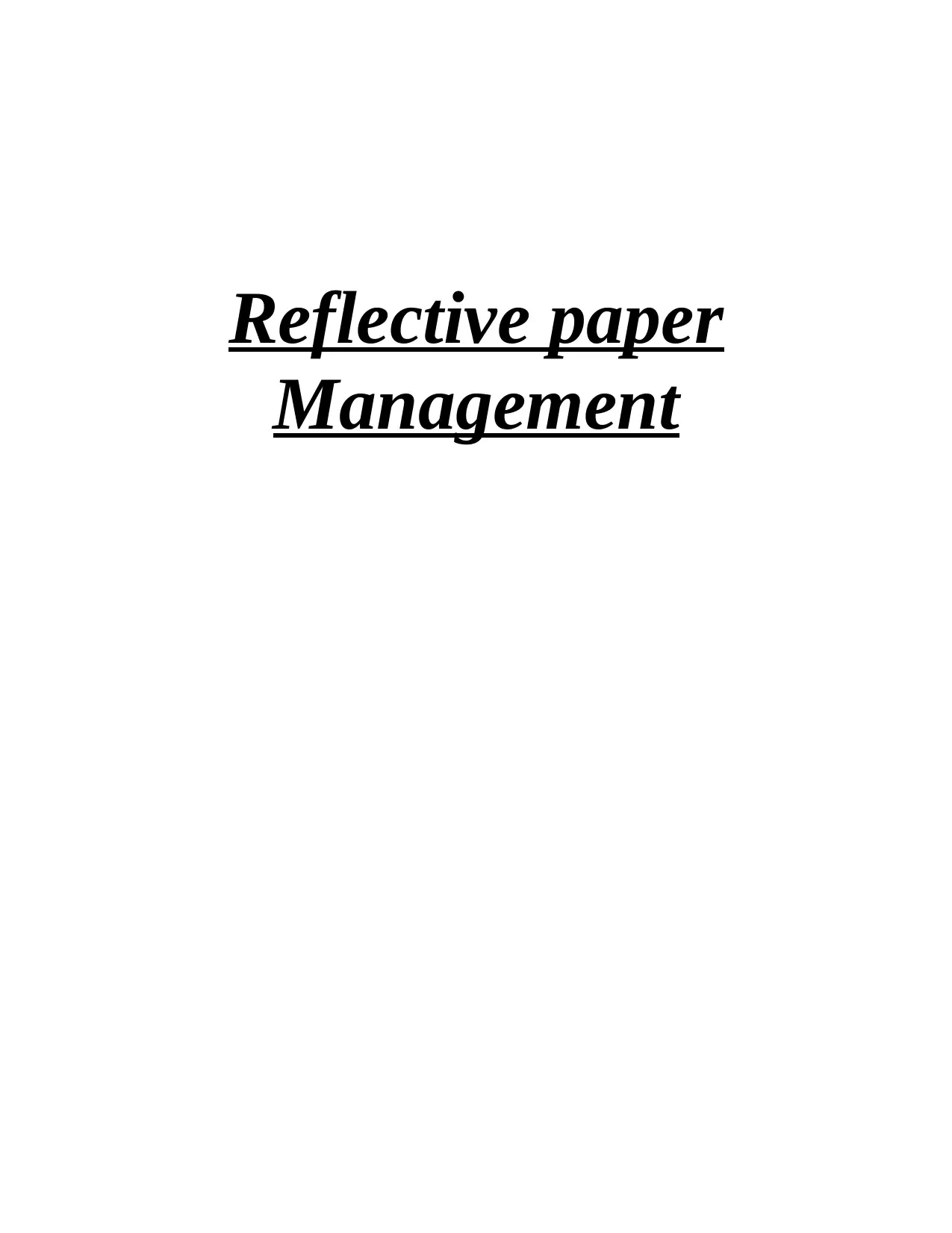
Reflective paper
Management
Management
Paraphrase This Document
Need a fresh take? Get an instant paraphrase of this document with our AI Paraphraser
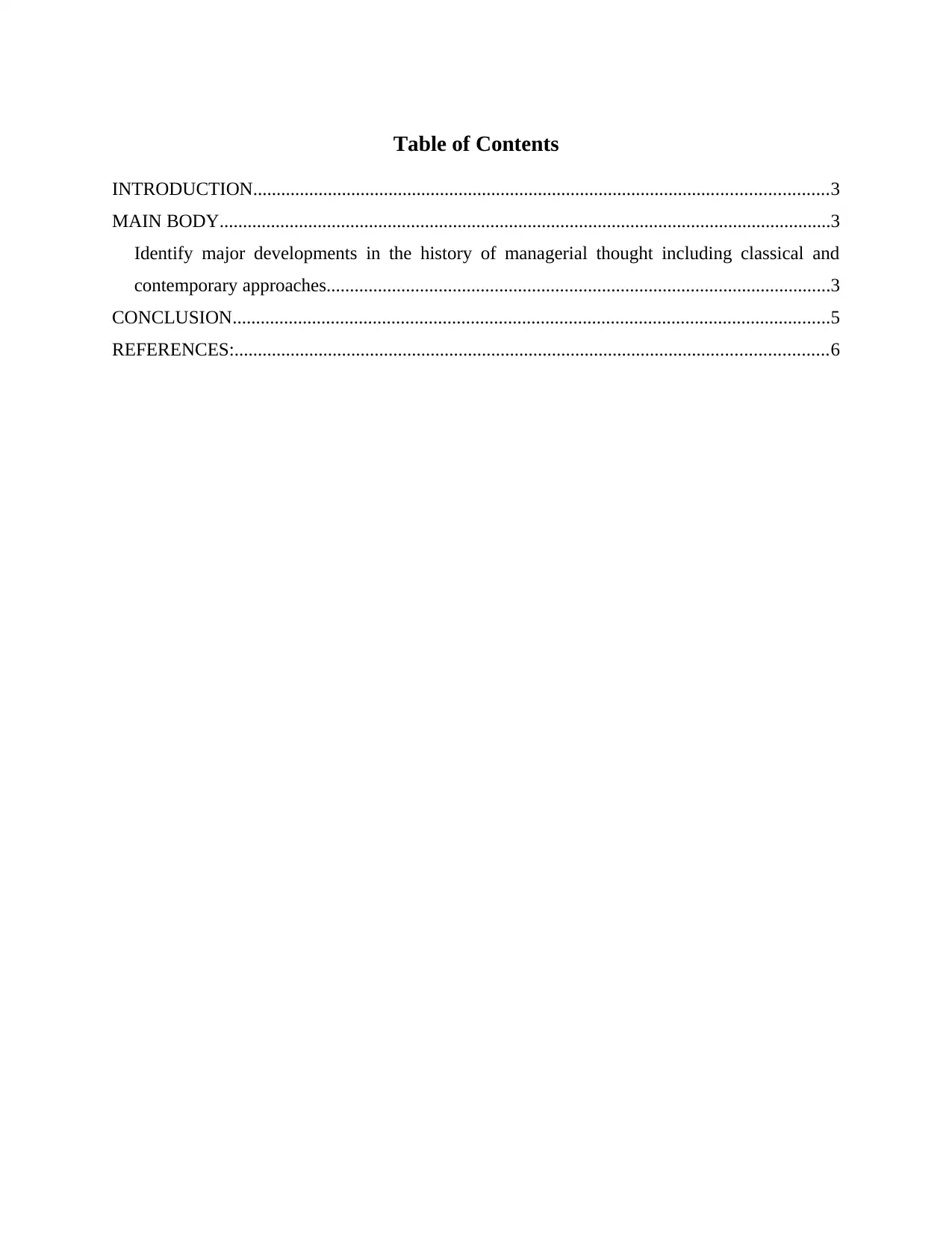
Table of Contents
INTRODUCTION...........................................................................................................................3
MAIN BODY...................................................................................................................................3
Identify major developments in the history of managerial thought including classical and
contemporary approaches............................................................................................................3
CONCLUSION................................................................................................................................5
REFERENCES:...............................................................................................................................6
INTRODUCTION...........................................................................................................................3
MAIN BODY...................................................................................................................................3
Identify major developments in the history of managerial thought including classical and
contemporary approaches............................................................................................................3
CONCLUSION................................................................................................................................5
REFERENCES:...............................................................................................................................6
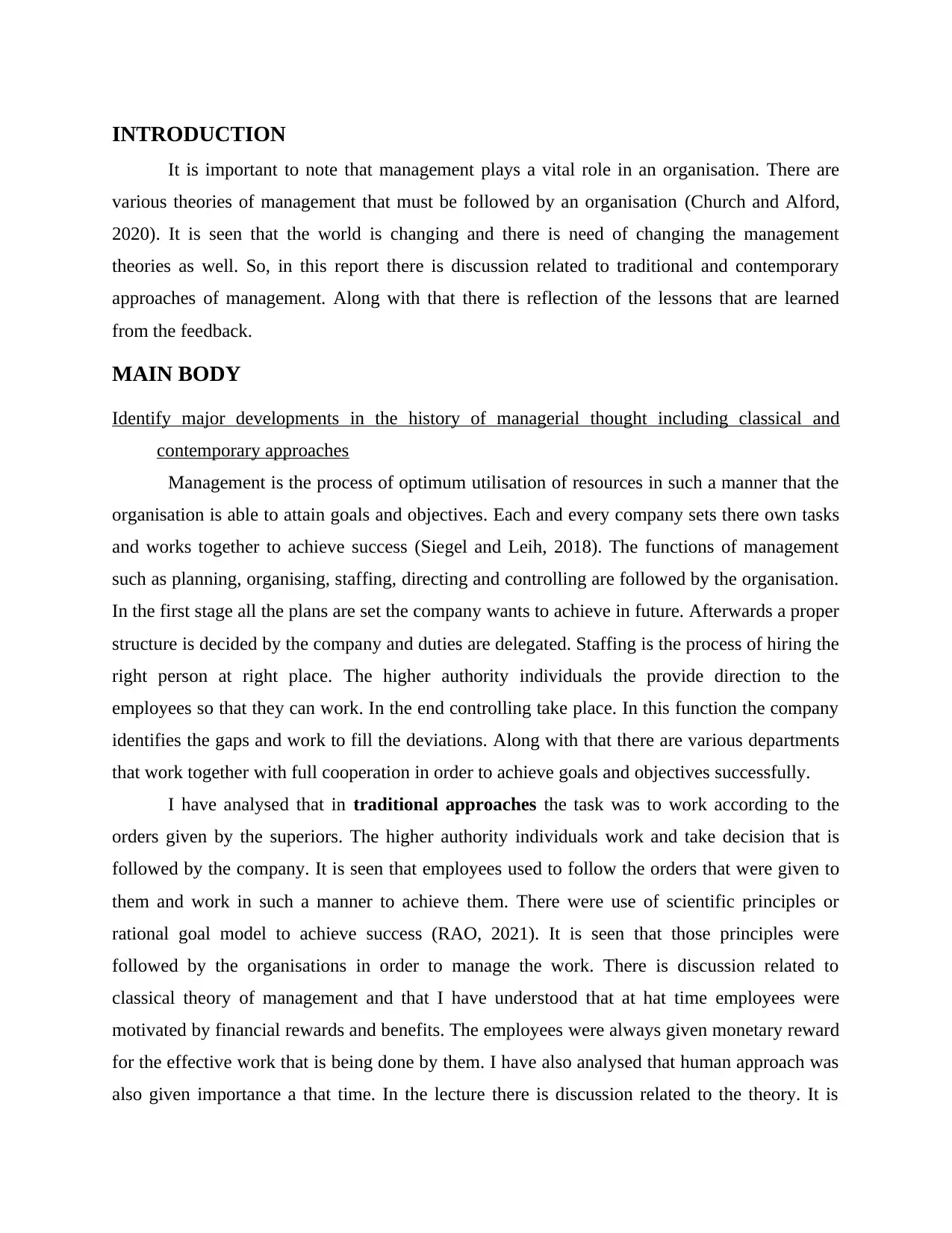
INTRODUCTION
It is important to note that management plays a vital role in an organisation. There are
various theories of management that must be followed by an organisation (Church and Alford,
2020). It is seen that the world is changing and there is need of changing the management
theories as well. So, in this report there is discussion related to traditional and contemporary
approaches of management. Along with that there is reflection of the lessons that are learned
from the feedback.
MAIN BODY
Identify major developments in the history of managerial thought including classical and
contemporary approaches
Management is the process of optimum utilisation of resources in such a manner that the
organisation is able to attain goals and objectives. Each and every company sets there own tasks
and works together to achieve success (Siegel and Leih, 2018). The functions of management
such as planning, organising, staffing, directing and controlling are followed by the organisation.
In the first stage all the plans are set the company wants to achieve in future. Afterwards a proper
structure is decided by the company and duties are delegated. Staffing is the process of hiring the
right person at right place. The higher authority individuals the provide direction to the
employees so that they can work. In the end controlling take place. In this function the company
identifies the gaps and work to fill the deviations. Along with that there are various departments
that work together with full cooperation in order to achieve goals and objectives successfully.
I have analysed that in traditional approaches the task was to work according to the
orders given by the superiors. The higher authority individuals work and take decision that is
followed by the company. It is seen that employees used to follow the orders that were given to
them and work in such a manner to achieve them. There were use of scientific principles or
rational goal model to achieve success (RAO, 2021). It is seen that those principles were
followed by the organisations in order to manage the work. There is discussion related to
classical theory of management and that I have understood that at hat time employees were
motivated by financial rewards and benefits. The employees were always given monetary reward
for the effective work that is being done by them. I have also analysed that human approach was
also given importance a that time. In the lecture there is discussion related to the theory. It is
It is important to note that management plays a vital role in an organisation. There are
various theories of management that must be followed by an organisation (Church and Alford,
2020). It is seen that the world is changing and there is need of changing the management
theories as well. So, in this report there is discussion related to traditional and contemporary
approaches of management. Along with that there is reflection of the lessons that are learned
from the feedback.
MAIN BODY
Identify major developments in the history of managerial thought including classical and
contemporary approaches
Management is the process of optimum utilisation of resources in such a manner that the
organisation is able to attain goals and objectives. Each and every company sets there own tasks
and works together to achieve success (Siegel and Leih, 2018). The functions of management
such as planning, organising, staffing, directing and controlling are followed by the organisation.
In the first stage all the plans are set the company wants to achieve in future. Afterwards a proper
structure is decided by the company and duties are delegated. Staffing is the process of hiring the
right person at right place. The higher authority individuals the provide direction to the
employees so that they can work. In the end controlling take place. In this function the company
identifies the gaps and work to fill the deviations. Along with that there are various departments
that work together with full cooperation in order to achieve goals and objectives successfully.
I have analysed that in traditional approaches the task was to work according to the
orders given by the superiors. The higher authority individuals work and take decision that is
followed by the company. It is seen that employees used to follow the orders that were given to
them and work in such a manner to achieve them. There were use of scientific principles or
rational goal model to achieve success (RAO, 2021). It is seen that those principles were
followed by the organisations in order to manage the work. There is discussion related to
classical theory of management and that I have understood that at hat time employees were
motivated by financial rewards and benefits. The employees were always given monetary reward
for the effective work that is being done by them. I have also analysed that human approach was
also given importance a that time. In the lecture there is discussion related to the theory. It is
⊘ This is a preview!⊘
Do you want full access?
Subscribe today to unlock all pages.

Trusted by 1+ million students worldwide
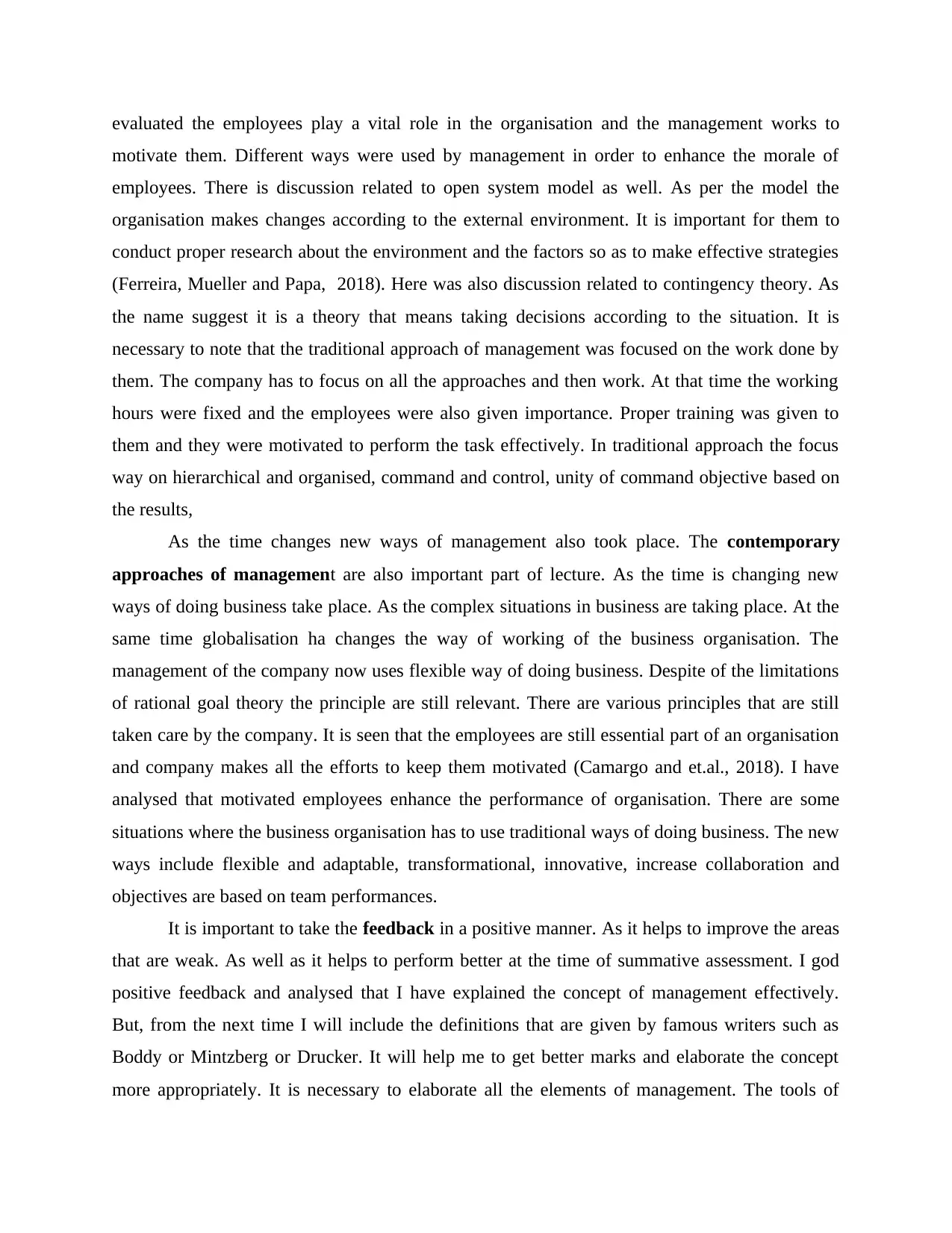
evaluated the employees play a vital role in the organisation and the management works to
motivate them. Different ways were used by management in order to enhance the morale of
employees. There is discussion related to open system model as well. As per the model the
organisation makes changes according to the external environment. It is important for them to
conduct proper research about the environment and the factors so as to make effective strategies
(Ferreira, Mueller and Papa, 2018). Here was also discussion related to contingency theory. As
the name suggest it is a theory that means taking decisions according to the situation. It is
necessary to note that the traditional approach of management was focused on the work done by
them. The company has to focus on all the approaches and then work. At that time the working
hours were fixed and the employees were also given importance. Proper training was given to
them and they were motivated to perform the task effectively. In traditional approach the focus
way on hierarchical and organised, command and control, unity of command objective based on
the results,
As the time changes new ways of management also took place. The contemporary
approaches of management are also important part of lecture. As the time is changing new
ways of doing business take place. As the complex situations in business are taking place. At the
same time globalisation ha changes the way of working of the business organisation. The
management of the company now uses flexible way of doing business. Despite of the limitations
of rational goal theory the principle are still relevant. There are various principles that are still
taken care by the company. It is seen that the employees are still essential part of an organisation
and company makes all the efforts to keep them motivated (Camargo and et.al., 2018). I have
analysed that motivated employees enhance the performance of organisation. There are some
situations where the business organisation has to use traditional ways of doing business. The new
ways include flexible and adaptable, transformational, innovative, increase collaboration and
objectives are based on team performances.
It is important to take the feedback in a positive manner. As it helps to improve the areas
that are weak. As well as it helps to perform better at the time of summative assessment. I god
positive feedback and analysed that I have explained the concept of management effectively.
But, from the next time I will include the definitions that are given by famous writers such as
Boddy or Mintzberg or Drucker. It will help me to get better marks and elaborate the concept
more appropriately. It is necessary to elaborate all the elements of management. The tools of
motivate them. Different ways were used by management in order to enhance the morale of
employees. There is discussion related to open system model as well. As per the model the
organisation makes changes according to the external environment. It is important for them to
conduct proper research about the environment and the factors so as to make effective strategies
(Ferreira, Mueller and Papa, 2018). Here was also discussion related to contingency theory. As
the name suggest it is a theory that means taking decisions according to the situation. It is
necessary to note that the traditional approach of management was focused on the work done by
them. The company has to focus on all the approaches and then work. At that time the working
hours were fixed and the employees were also given importance. Proper training was given to
them and they were motivated to perform the task effectively. In traditional approach the focus
way on hierarchical and organised, command and control, unity of command objective based on
the results,
As the time changes new ways of management also took place. The contemporary
approaches of management are also important part of lecture. As the time is changing new
ways of doing business take place. As the complex situations in business are taking place. At the
same time globalisation ha changes the way of working of the business organisation. The
management of the company now uses flexible way of doing business. Despite of the limitations
of rational goal theory the principle are still relevant. There are various principles that are still
taken care by the company. It is seen that the employees are still essential part of an organisation
and company makes all the efforts to keep them motivated (Camargo and et.al., 2018). I have
analysed that motivated employees enhance the performance of organisation. There are some
situations where the business organisation has to use traditional ways of doing business. The new
ways include flexible and adaptable, transformational, innovative, increase collaboration and
objectives are based on team performances.
It is important to take the feedback in a positive manner. As it helps to improve the areas
that are weak. As well as it helps to perform better at the time of summative assessment. I god
positive feedback and analysed that I have explained the concept of management effectively.
But, from the next time I will include the definitions that are given by famous writers such as
Boddy or Mintzberg or Drucker. It will help me to get better marks and elaborate the concept
more appropriately. It is necessary to elaborate all the elements of management. The tools of
Paraphrase This Document
Need a fresh take? Get an instant paraphrase of this document with our AI Paraphraser
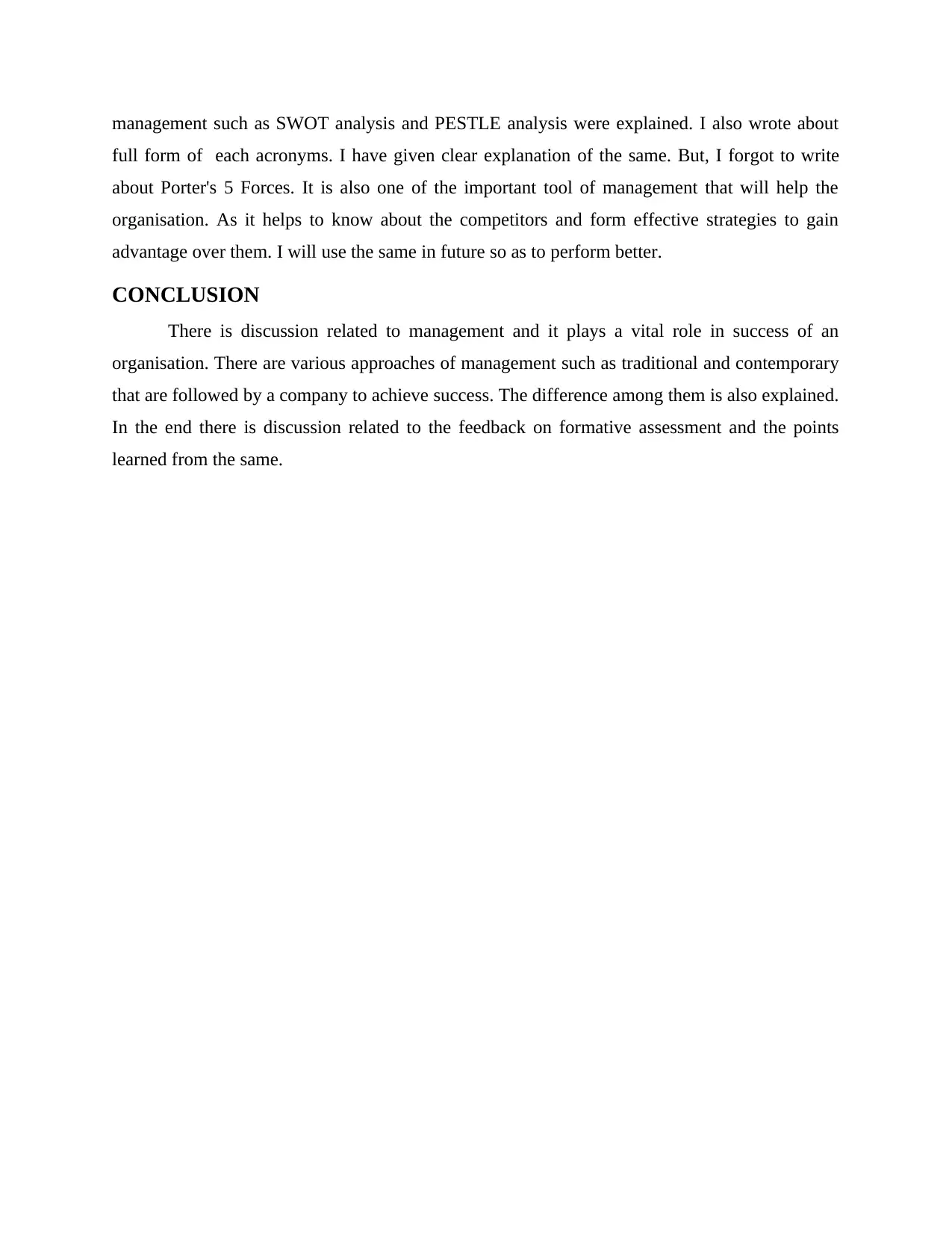
management such as SWOT analysis and PESTLE analysis were explained. I also wrote about
full form of each acronyms. I have given clear explanation of the same. But, I forgot to write
about Porter's 5 Forces. It is also one of the important tool of management that will help the
organisation. As it helps to know about the competitors and form effective strategies to gain
advantage over them. I will use the same in future so as to perform better.
CONCLUSION
There is discussion related to management and it plays a vital role in success of an
organisation. There are various approaches of management such as traditional and contemporary
that are followed by a company to achieve success. The difference among them is also explained.
In the end there is discussion related to the feedback on formative assessment and the points
learned from the same.
full form of each acronyms. I have given clear explanation of the same. But, I forgot to write
about Porter's 5 Forces. It is also one of the important tool of management that will help the
organisation. As it helps to know about the competitors and form effective strategies to gain
advantage over them. I will use the same in future so as to perform better.
CONCLUSION
There is discussion related to management and it plays a vital role in success of an
organisation. There are various approaches of management such as traditional and contemporary
that are followed by a company to achieve success. The difference among them is also explained.
In the end there is discussion related to the feedback on formative assessment and the points
learned from the same.
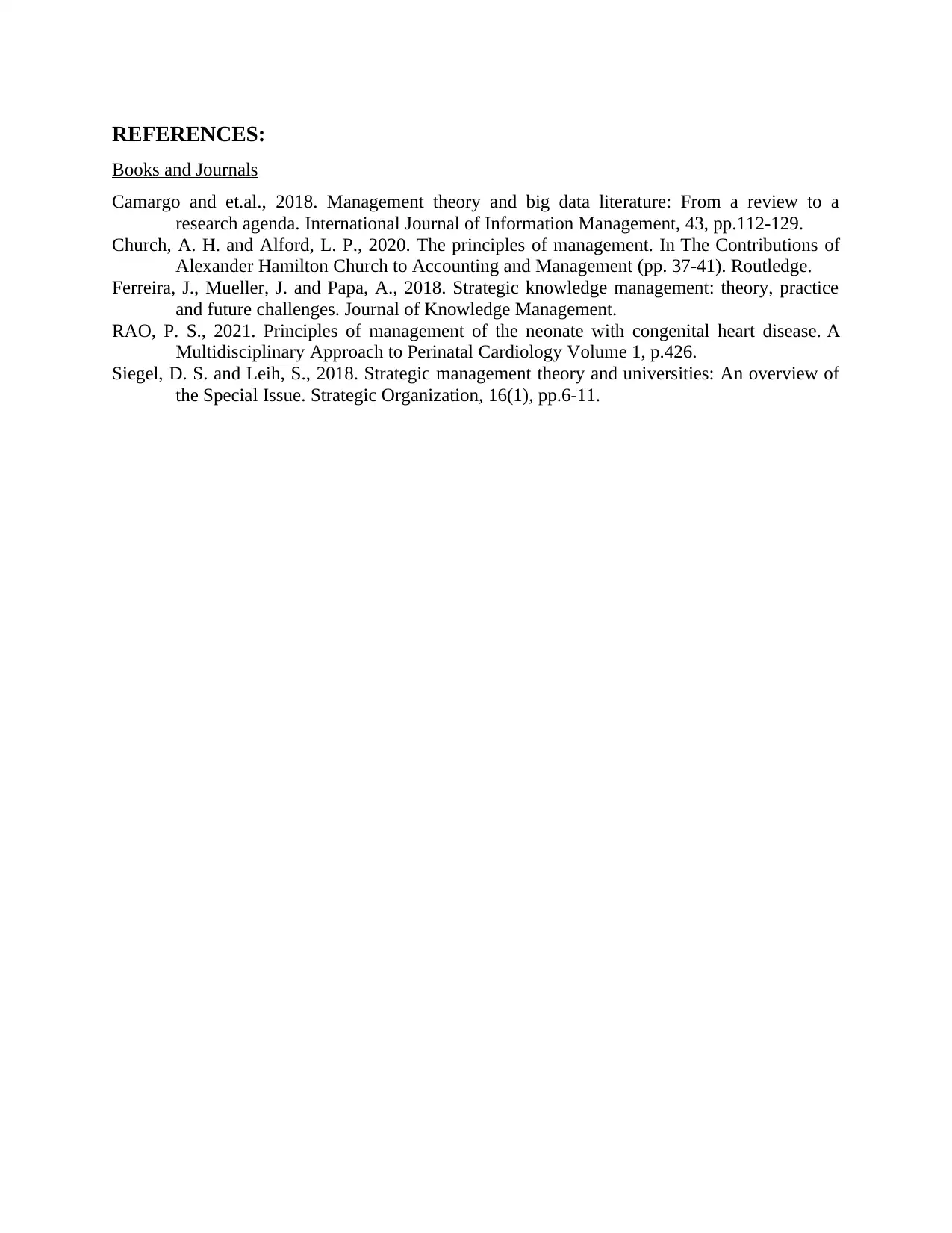
REFERENCES:
Books and Journals
Camargo and et.al., 2018. Management theory and big data literature: From a review to a
research agenda. International Journal of Information Management, 43, pp.112-129.
Church, A. H. and Alford, L. P., 2020. The principles of management. In The Contributions of
Alexander Hamilton Church to Accounting and Management (pp. 37-41). Routledge.
Ferreira, J., Mueller, J. and Papa, A., 2018. Strategic knowledge management: theory, practice
and future challenges. Journal of Knowledge Management.
RAO, P. S., 2021. Principles of management of the neonate with congenital heart disease. A
Multidisciplinary Approach to Perinatal Cardiology Volume 1, p.426.
Siegel, D. S. and Leih, S., 2018. Strategic management theory and universities: An overview of
the Special Issue. Strategic Organization, 16(1), pp.6-11.
Books and Journals
Camargo and et.al., 2018. Management theory and big data literature: From a review to a
research agenda. International Journal of Information Management, 43, pp.112-129.
Church, A. H. and Alford, L. P., 2020. The principles of management. In The Contributions of
Alexander Hamilton Church to Accounting and Management (pp. 37-41). Routledge.
Ferreira, J., Mueller, J. and Papa, A., 2018. Strategic knowledge management: theory, practice
and future challenges. Journal of Knowledge Management.
RAO, P. S., 2021. Principles of management of the neonate with congenital heart disease. A
Multidisciplinary Approach to Perinatal Cardiology Volume 1, p.426.
Siegel, D. S. and Leih, S., 2018. Strategic management theory and universities: An overview of
the Special Issue. Strategic Organization, 16(1), pp.6-11.
⊘ This is a preview!⊘
Do you want full access?
Subscribe today to unlock all pages.

Trusted by 1+ million students worldwide
1 out of 6
Related Documents
Your All-in-One AI-Powered Toolkit for Academic Success.
+13062052269
info@desklib.com
Available 24*7 on WhatsApp / Email
![[object Object]](/_next/static/media/star-bottom.7253800d.svg)
Unlock your academic potential
Copyright © 2020–2025 A2Z Services. All Rights Reserved. Developed and managed by ZUCOL.


